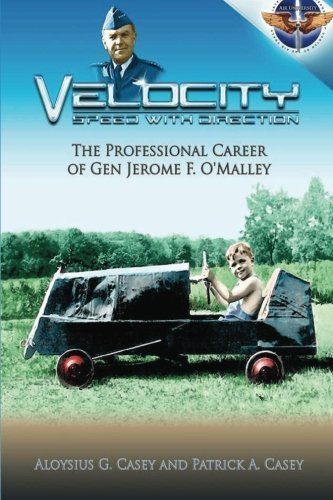
Velocity Speed with Direction - the Professional Career of Gen. Jerome F. O'Malley
This book developed from the close friendship between Patrick and his dad, Aloysius Casey. Although their residences are on opposite coasts of the country, they collaborated through years of research by e-mailing and telephoning each other several times a week; however, Aloysius Casey wrote the bulk of the text. Aloysius and Patrick directly confronted the only serious cloud hanging over Gen Jerome F. "Jerry" O'Malley's career, the Lavelle raids. Knowing Jerry's reputation for truthfulness, the authors believed his involvement in these raids presented a serious character question. During a meticulous review of the conduct of every member of the command structure in Vietnam, as well as a careful examination of congressional testimony, Patrick developed the view that senior Pentagon officials acted in a manner eerily similar to the behavior of officials he had faced in public corruption cases in his practice of law. This view fueled the authors' desire to seek the truth. The biography was delayed for two years while the Nixon White House audio recordings could be identified, obtained, and transcribed. It was delayed further so that Top Secret messages sent by the Joint Chiefs of Staff to Vietnam could be acquired through the Freedom of Information Act. The publication of this book puts to rest 35 years of false history. It also decisively concludes the erroneous dishonor suffered by Gen John Daniel Lavelle, the Seventh Air Force commander. General Lavelle, Colonel O'Malley, and personnel of the Seventh Air Force acted pursuant to presidential orders secretly issued on 3 February 1972 in the Oval Office. It is clear that they loyally and bravely served, protected, and defended the Constitution of the United States. General Lavelle's constitution in weathering the firestorm resulting from those strikes reveals him as a unique figure in American military history. Even when he was being framed by Pentagon and White House officials, he did not succumb to blaming those who served him in combat. His unflinching and selfless perseverance in his assumption of exclusive responsibility resulted in giving the United States Air Force some of its finest commanders during the Cold War-Generals Alton D. Slay, Charles A. Gabriel, and Jerome F. O'Malley. Wrongfully demoted and publicly ridiculed because of the obvious conspiratorial conduct of several senior Pentagon officials, General Lavelle's reputation for truthfulness now towers above the reputation of his accusers. Equally interesting is General O'Malley's ability not to sour on an Air Force career.